Columns
- Mahinda says the candidate who has the SLPP’s support will win the election
- NPP rallies attract massive crowds, confirming a political reality, but can 3 percent vote base be turned into 51 percent?
- President appeals to all parties to join him for the common good of the country and the next generation
- At SJB rally, opposition leader Premadasa spells out policies his government will implement
By Our Political Editor
Amidst the riot of colour and hoarse slogans at last Wednesday’s May Day rallies and processions, lay a plethora of political realities different from previous years.
Most importantly, for both ruling and opposition political parties, May Day became a launching pad for the presidential election campaigns. The presidential election is due any time after three months. There were negatives too. There were no shocks from crossovers or new alliances by the newcomers, as forecast, mounting one stage or the other. Nor did, as some expected, Ranil Wickremesinghe formally declare his candidature. He is delaying it for a reason.
Yet, there were a few minor events. One was Moneragala district SLPP parliamentarian Gayashan Navananda joining the Samagi Jana Balavegaya (SJB), “for the sake of the country.” How great after all these years! Then, the political pole vaulter, Wijeyadasa Rajapakshe, a Cabinet Minister, was at the Sri Lanka Freedom Party (SLFP) rally in Gampaha. This time, former president Maithripala Sirisena, who has been legally stripped of positions, declared Rajapakshe would be the SLFP presidential candidate. Rajapakshe is having the best of both worlds. He wants to be a rival to Ranil Wickremesinghe and continue to remain in his Cabinet of Ministers. Not surprising when he has hip-hopped so many political parties before his new zest to become President.
When he met Sri Lanka Podujana Peramuna (SLPP) founder Basil Rajapaksa on April 5, Wickremesinghe explained that as the head of the government, he was initiating several measures and did not want them to be construed by his opponents as political favours being delivered by a candidate. Then, it included the granting of free deeds to the landless. There were similar measures this week too. That was the increase in the wage of plantation workers from Rs 1,000 to Rs 1,700 a day. It has already earned the ire of the plantation management companies. They are to move the Supreme Court. Cooking gas prices have been lowered. The interest rate on the Employees Provident Fund (EPF) has been raised from 8% to 13%.
- The UNP rally held in Maligawatte
- The SJB rally in Chatham Street, Colombo Fort
- The NPP rally in Anuradhapura
- The National People’s Power rally in Matara
- The NPP rally in Colombo. Pix by M.A.Pushpa Kumara and Indika Handuwala
- A section of the crowd at the SLPP rally at Campbell Park. Note the empty chairs
Nevertheless, the absence of a formal announcement has come as fuel for rumours that Wickremesinghe will not contest. Such claims, however, run counter to the measures that are being initiated by the United National Party (UNP) leader and President. Other than his formal announcement, also expected is a declaration of support by the SLPP. That task has now been left in the hands of the SLPP leader and former President, Mahinda Rajapaksa. There are rumblings within the SLPP over the issue too. So much so, addressing their May Day rally, Rajapaksa took a broadside at those who were tailoring new suits to take on the mantle of the presidency. Some claim his target was on the stage when the remarks were made. To say it forcefully showed the seriousness of the issues.
May Day last week was one of those occasions when forecasts of heavy rains proved met officials wrong. Though hot, it did not disrupt the large turnout to various rallies. Yet, a forecast on the numbers, even Police estimates, is being cautiously avoided. The pictures of crowds on this page speak for themselves. They highlight a more significant factor. That is the emergence of newer political trends that will manifest at the presidential election and even shape its outcome.
One such instance is confirmation of the emergence of the Janatha Vimukthi Peramuna (JVP)-led National People’s Power (NPP) as a formidable political group. This lays to rest an oft-repeated claim that the NPP crowds were those from the JVP, the maximum they could muster, that again, on a May Day. This time, they held four rallies—in Jaffna, Anuradhapura, Colombo and Matara. The crowds in pictures show the turnout. The only venue where there was a poor turnout was in Jaffna. There was a distinctly noticeable feature on their platforms – gone are the cutouts of Karl Marx, Engels, Lenin, and Rohana Wijeweera. Even if it was intended to show that the NPP has arrived as a ‘new political entity with a new identity,’ it suggested a marked shift. It comes in the backdrop of the NPP’s international acceptance. Its rally in Matara easily outweighed the turnout at Chatham Street in Colombo where the Samagi Jana Balavegaya (SJB) rally was held. That is if the turnout in Colombo was compared to that of the SJB. If the turnouts in all four venues are added, there is still no comparison. The NPP has emerged as a front-runner in a close encounter though there are sections who may wish to believe it is not true. A segment insists it is propaganda, but May Day has changed it. That is for the discerning who have watched May Day beyond the rallies and slogans.
NPP leader Anura Kumara Dissanayake addressed the party rally in Matara and drove down to Colombo. The rally was held in the main road opposite the Vihara Maha Devi Park, just near Upali’s Restaurant. Dissanayake noted, “Some argue with mathematical precision, debating the likelihood of transitioning from 3% (the JVP polled at a national election last) to 51%. They question how a margin of three to four hundred thousand votes could equate to seven million. Yet, politics isn’t a mathematical equation; it’s a dynamic social science. If politics were algebraic, Gotabaya Rajapaksa, with 6.9 million votes, would still hold the presidency, and Mahinda Rajapaksa, having secured two-thirds in parliament, would remain Prime Minister.”
Some other highlights from his speech: “We earnestly anticipate that this will be the final May Day under the shadow of a corrupt elite regime. With the presidential election slated to occur between September 17 and October 17, we have meticulously strategised for the triumph of the National Peoples Power (NPP). I assure you that May Day 2025 will dawn under the governance of the NPP. At the Samagi Jana Balawegaya meeting on Chatham Street, former minister G.L Peiris from Mahinda Rajapaksa’s camp is present. On the SJB stage, figures like Gotabaya’s onetime minister Nalaka Godaheva, Ranil’s former minister Sajith Premadasa, Gayantha Karunathilaka, Lakshman Kiriella among others, gather. Even Maithripala Sirisena’s former minister Dilan Perera makes an appearance.
“Meanwhile, at Campbell Park, Mahinda Rajapaksa, accompanied by his former minister Basil Rajapaksa, Gotabaya’s government minister Namal Rajapaksa, and Ranil Wickremesinghe’s government minister Prasanna Ranatunga, are in attendance. At Maligawatte, where the UNP rally is underway, Maithripala Sirisena’s former ministers like Harin Fernando, Manusha Nanayakkara, and Ravi Karunanayake, who served in Ranil’ s government, gather alongside other ministers. The same coalition seems to have fragmented into various platforms. Additionally, there are orphans present on the Kirulapone side. While all these factions assemble in four different locations, only we, the National People’s Power (NPP), is striving to transform our country. Sri Lanka is witnessing, for the first time, efforts to empower the common people. This has left the corrupt ruling elite perturbed and disoriented.”
Notably, UNP leader Wickremesinghe came to his Maligawatte rally wearing a white shirt. He was steering clear of colours of other parties.
Dissanayake devoted considerable attention to his much-publicised debate between him and SJB leader Sajith Premadasa. He said, “The S.J.B. appears to be an immature and fractious group, prone to morning and evening bouts of discontent. They lamented receiving the space they requested for May Day, only to subsequently claim that a deal exists between Ranil Wickramasinghe and the JVP, prompting a month-long dispute. We formally appointed Comrade Nalinda Jayatissa as the coordinator for the debate and sent a letter to the General Secretary with four days’ notice, proposing May 7, 9, 13, and 14 as potential debate dates.
“Despite mutual agreement on these dates and the debate format, they resorted to theatrics, rallying primary schoolchildren near Monaragala, proclaiming their readiness for debate. Their bravado resembles the loudest of cries in a cemetery. This debate saga needs closure. Comrade Nalinda Jayatissa, on April 24, requested a date before May 20 for finalisation. Let us engage in specifics. If the proposed four days are not feasible, we await their proposed alternative date. It is evident they lack a coherent political agenda.”
Aerial photos, though banned by the Defence Ministry, were carried out by most participants. Chatham Street was a sea of heads with SJB supporters. Some of the internal bickering within the party surfaced. One was the listing of Field Marshal Sarath Fonseka as one of the final speakers. He left the event early. One of the noteworthy features was the absence of senior party members in photographs together with Premadasa. Both Mujibur Rahman (a former Colombo district MP) and S.M. Marikkar stood around him.
Premadasa announced that he would re-negotiate the agreement with the International Monetary Fund (IMF). His speech was akin to a policy statement. He read out a list of measures he would adopt when he became President. The catalogue included welfare measures for female-led households and care for 1.7 million differently-abled people. He said his government would boost health care and develop the IT industry.
In his speech at the UNP rally, President Ranil Wickremesinghe appealed to opposition parties to support his government’s arrangements with the IMF.
The venue for the UNP rally had been changing weeks ahead of May Day. At first, it was planned to be held at Independence Square and later shifted to the road outside the Elphinstone theatre. Thereafter, it was shifted again to Maligawatte, near the Police station. Speakers spent considerable time listing the achievements of President Ranil Wickremesinghe and thus, the imperative need to support him. A crowd puller was the performance by both Indian and local artistes.
Premadasa also used the occasion to explain why he did not accept the post of Prime Minister that was offered to him by then-President, Gotabaya Rajapaksa. “Some people tell me that I should have taken a short cut to power. I could have become the Premier during the constitutional crisis in 2018.” Premadasa pledged that all revenue-earning state ventures will be made profitable. There will be both public-sector and private-sector partnerships, he said.
He disclosed that the SJB has evolved a proposal to get to the bottom of those who were responsible for the Easter Sunday attacks. He said that has been made available to the Catholic church. He noted that tea smallholders own 40 per cent. However, they were responsible for 70 per cent of tea production. He would also create a national wealth fund.
President Wickremesinghe also struck the same note. He said, “Some thought that the United National Party (UNP) was over. They said that UNP should be buried, but what we did was to give new life to the economy which was going to be buried. When the UNP seats were reduced to eight in 1956, they said that the final nail of the UNP’s coffin had been struck, but the UNP again rose to the top. When UNP seats were reduced to 17 in 1970 then too they said that UNP was finished. However, after that, we had a government for 17 years. When they said that the UNP was finished today, the UNP was the party that stood up and came forward at this moment.
“Some say that I am a dictator, but everyone can have meetings, go to the streets and even scold me. This atmosphere was not there two years ago. Then the opposition leader was assaulted and chased away from Galle Face Green. Today we allowed him to gather crowds at Chatham Street. Isn’t that democracy? I became the Prime Minister and the President because the political system of this country collapsed. Normally when the Prime Minister resigns, the common tradition in every country is that the opposition leader takes on the responsibility. At least they say that he could say he is ready to take over but unsure whether he has numbers in favour.
“When President Gotabaya Rajapaksa went away from the country when the Army came to parliament and asked what should be done from these people (SJB), and mobs were coming towards parliament, everyone in parliament ran away. Then the Army commander asked me what to do. Then I queried what the party leaders said, thee Army commander said everyone ran away. I told him that your job is to protect the parliament. After that point the protests (aragalaya )was stopped. If they cannot do that simple task, how can they speak about parliamentary democracy?”
“Look at the state of the country, May Day rallies are held everywhere, now buses operate, two years back even buses did not have fuel, and people were unable to get diesel. If that situation persisted people would have to push the buses and come for rallies. We even celebrated Sinhala Tamil New Year in a good manner. These were achieved as the UNP bravely went forward as the government. We had to make tough decisions, sometimes it is difficult to make those decisions. But we created stability. The IMF told us that we cannot print more money, or take loans from banks and we need an income of said amount.
“The only option was to increase the Value Added Tax (VAT), I knew the rupee would strengthen if VAT was increased. The VAT increase was a difficult decision. There were many rounds of talks with ministers, and I told them not to do anything and that I would take the decision. When I took the decision everyone (SJB, and JVP) criticised me, but I knew that decision must be taken. We came to this point with difficulty, we came to this point by getting into an agreement with the IMF, and we need to protect this achievement. I appeal to other parties, especially the SJB and to the JVP (NPP) not to go against these achievements. I appeal to them to think about the people and protect the prevailing situation by signing an agreement with the government.
“The IMF conditions are required for the rapid development of the country. Therefore, I would present a law that contains the IMF condition to parliament and ask everyone to support it. I would like to request the SJB and the JVP to agree on that matter. “I tell both the SJB and the JVP to forget everything and without remaining in traditional politics to join us to secure the economy to provide a better future for youth. I ask the support of the whole country to make a new economic transformation to secure the stability of the country.”
There is no gainsaying that the SLPP has emerged as a powerful political party in the country’s political landscape. Despite the mounting criticism against the party, it is noteworthy that it was able to muster a substantial crowd. Most were contained inside a large tent though some of the seats were vacant. SLPP leader, former President Mahinda Rajapaksa, made a strong point about his party – whoever wants to win a national election would have to have the backing of his party. Highlights of what he said:
“Many extremists attempted to assemble to spread lies and make unfounded charges about the SLPP. We have overcome that. We are confident that we can do justice to the expectations of every citizen in the nation. It has been observed that the workforce is split into parties and has always participated in processions, acting the role of a pawn. The majority of party leaders frequently use the labour force to maintain this trend in an effort to protect themselves; yet, nobody is willing to bring about a change and work to improve the country as a whole, protecting the future of the next generation. The SLPP continues to hold the people’s hearts and be it workforce in farmlands or in streets we have been by their side 24/7 when we were in power as well as when we were not.
“In good conscience, we can guarantee that we have never used the labour force of the nation as pawns to go on processions. Currently a labourer, tomorrow a professional. We started Sri Lanka’s labourers’ ‘grama wasana aramudala’ project for the first time ever, and it allowed laborers to advance into professionals. Working people were greatly assisted by this effort in taking their lives one step forward. By doing this, the country as a whole would advance along with the worker. This will create the necessary socioeconomic environment for the development of the nation.
“The SLPP, irrespective of the political atmosphere in the country, will always stand by peoples’ welfare and development. Looking back at global history, it is evident that all labour leaders have cultivated tight relationships with their workforces and delivered necessary solutions to their problems. Similarly, many issues can be resolved through discourse. This ought to extend beyond May Day.
“Regardless of who raises voices, the SLPP still has the power of most of the labour in this country, whether it is in the streets or on farmlands. This may be a decisive rally. We ought to consider right now who will control the direction of the nation following the next presidential election. These days, a lot of so-called political figures try to tarnish the reputation of SLPP officials in various ways. This is due to their knowledge that the SLPP still holds the support of the people, thus they are trying to split the party’s 69 million votes to bring it to an end. As a country, we shouldn’t hand the reins to those who have made worse blunders than us.
“The SLPP is currently the only party in this nation with the strength to act and bring about change. We remain quite confident that the candidate backed by the SLPP will emerge victorious in this year’s presidential contest. We will be there for him as he advances towards the growth of the country.”
Last Wednesday morning, President Wickremesinghe attended the pro-Government Ceylon Workers Congress (CWC) rally at Kotagala. This was while Premadasa attended the Talawakelle May Day rally organised by the Upcountry-based Tamil parties supporting the SJB.
The May Day rally organised by Ilankai Thamil Arasu Katchchi (ITAK) saw workers from various walks of life taking part in the march which began from Kilinochchi town towards the playground of Kilinochchi Central College.
In these May Day rallies, there will be several takeaways for the major political parties. There will no doubt be rewards and recognition for those who mustered the largest crowds from different electorates. Those who are displaying a ‘poor show,’ saving their resources for a parliamentary general election, are in for disappointment. This is why last Wednesday’s May Day rally is different from those of the previous years.
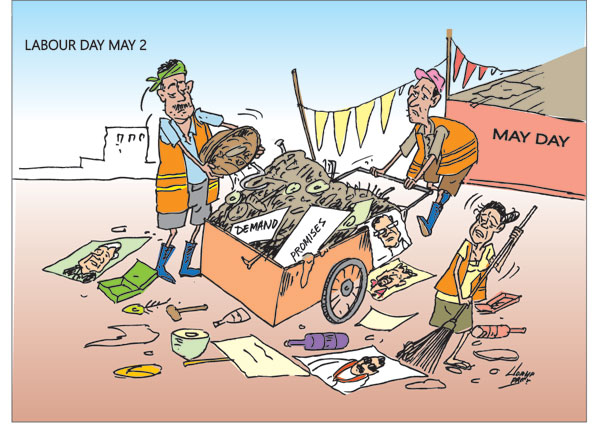
Buying or selling electronics has never been easier with the help of Hitad.lk! We, at Hitad.lk, hear your needs and endeavour to provide you with the perfect listings of electronics; because we have listings for nearly anything! Search for your favourite electronic items for sale on Hitad.lk today!


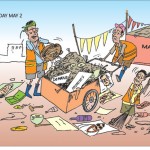
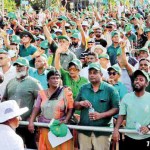
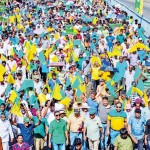
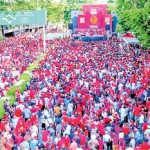
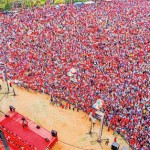
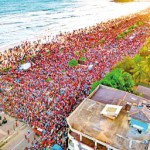
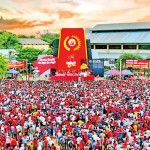
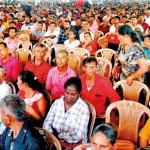
May Day rallies launching for presidential poll
View(s):